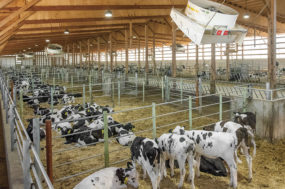For the 5,000 dairy farm families who call Pennsylvania home, they are focused on producing wholesome products for their communities and sustainable family businesses for generations to come. Leveraging funds provided by the Commonwealth of Pennsylvania, Northeast Dairy Business Innovation Center (NE-DBIC), PA Dairymen’s Association and other partners, the Center for Dairy Excellence helps dairy farm families excel through various opportunities to make sound business decisions that shape the future of their farms.
These dairy producers are boosting profitability, driving excellence and fine-tuning their operations.
Investments in cow comfort and efficiency
The Dairy Excellence Grant has supported a collective reinvestment of more than $3,688,639 into Pennsylvania dairy farms across all of the funded projects to date. Accepted improvement projects focus on improving milk production per cow and/or enhancing overall farm profitability and efficiency.
For Lori Kauffman of Kauffman Dairy Farm, her family used the grant to upgrade from calf hutches to calf condos that allow them to focus on group housing. Not only did the grant program help them financially, but it has also improved herd health. The Kauffmans have noticed stronger, healthier heifers two years after investing in the new calf facilities.
The family went from housing for nine calves to housing for 12 calves.
“We were upgrading from calf hutches for multiple reasons,” Kauffman says. “They were also old, outdated hutches on the side of a hill, so during the project, we did some excavating for better drainage. We’re able to do group housing in them easier.”
These grants often mean the difference between a dairy producer investing in an improvement project that could boost profitability or putting it off for another year.
“Any chance to better your farm and your productivity, and any little boost to help, makes a big difference in this journey of dairy farming,” Kauffman says. “[The grant] might not cover the entire project, but for us, it made the difference between us having enough to swing it or put it off another year.”
One-on-one consulting in seven key areas
The Dairy Decisions Consultants (DDC) program provides dairy farm families with one-on-one professional consulting resources to help make decisions that shape the future of their farm. After being paired with a consultant who has years of experience in the dairy industry, dairy producers can hone in on specific areas of their business. These areas include employee management and communication, business planning and structure, product marketing and labeling, direct marketing, animal welfare, financial management and pre-farm transition planning.
Todd Benedict of Sunset Dairy in Warren County, Pennsylvania used the program to better analyze his cash flow and financial performance. While Benedict has been farming for years, his consultant, Bruce, helped him consider simple, everyday changes that could boost profitability – and kept all members of the dairy team working toward the same goal.
“I’ve been doing everything on cash flow, and it got to be pretty tight,” Benedict says. “Bruce put all my finances together and made a package. He wants to meet every quarter and see what we can do to better the farm and see where my weak points are. It’s pretty cool when he breaks it out like that.”
In one instance, Bruce showed Benedict that his feed over income was 10 cents per hundredweight higher than average.
“I’m still within the mean, but he challenged me by asking, ‘What can you do to change that?’” Benedict says. “So, I talked to my nutritionist and he used the information like he was supposed to. It helps make everybody accountable.”
This type of one-on-one consulting is ideal for dairy farm families who are in any stage of business. Whether they have been farming for decades, or they are just getting started building their own herd and looking to create a business plan, consultants can help provide an outside perspective. For Donald Miller and his wife, Gabrielle, of Blair County, Pennsylvania, their consultant helped them take the leap and start their own dairy operation from scratch.
“[Starting from scratch] was the hardest thing,” Miller says. “We have a lot of neighbors who are taking over for their fathers or uncles, so for us, it was hard to see all the overhead going into it at first. I needed help with a business plan and cash flow plan. Charlie [our consultant] even came out to the farm one time and looked things over. He really helped us to keep the process moving. Without Charlie, I probably wouldn’t be doing this.”
Enhancing value-added marketing and branding
For dairy value-added businesses, the center leverages funds provided by the NE-DBIC to offer grant opportunities for producers across the northeast U.S. These grants have helped pair producers with consultants who can help them make day-to-day decisions related to marketing, labeling, branding, product sales and consumer access.
For Ariel Herrod, the owner of Clear Spring Creamery in Maryland, the grant helped her make some key management decisions after purchasing the creamery in 2022. Her team produces whole milk, chocolate milk and yogurt, and they are evaluating new product offerings for the next year. Herrod was working through the decision-making process for raising prices, projecting how potential changes could impact her bottom line and evaluating whether to hire more labor or make equipment upgrades.
“It was a huge relief when I learned about this grant and the opportunity for Maryland farmers,” she says. “There were too many variables. I couldn’t figure out how to make these kind of financial decisions. Thanks to the grant, I could work with the consultants, and they helped me make those decisions. I’ve had a better balance in my bank account. We ran some metrics to quantify how the [decisions] have impacted us. Based on items sold, we saw a 23 percent increase in revenue. It was so beautiful.”
Outside perspective on transition planning and family dynamics
Transition and succession planning is also top of mind for many Pennsylvania dairy farm families who are managing multigenerational family businesses. The center’s Transition Team Grants give families the opportunity to work with a trusted team of consultants who have experience navigating family dynamics and creating plans for the future.
Kerry Zeiset, a dairy producer from Lancaster County, Pennsylvania, had an active role on his family’s 72-cow dairy farm and a strong interest in continuing to farm with his family in the future. Like many dairy farm families, he was not sure how to take the next steps into ownership with his parents. When his mom had a minor health challenge and his dad needed more help, the family decided to make transition planning a priority.
“I heard about the grant from the center and thought it would be good to have a consultant come in and look at things from a financial perspective,” Zeiset says. “We talked about different ideas for doing a slow transition between me and my dad.”
Thanks to outside consultants who helped facilitate constructive conversations between family members, Zeiset says it forced them to prioritize transition planning and took the financial burden out of the equation.
“Overall, we feel good,” he added. “Without the grant, we wouldn’t be where we are. Some of us didn’t want to talk about [the transition] or face reality, but the meetings made us stop and talk about it. It would be hard to spend that money upfront for an adviser without the grant. But I wouldn’t do it without a third-party consultant walking alongside us. It’s so valuable.”
Visit the Center's website and click on “Grant Programs” to learn more about each program. Many of these grant programs opened in the fall of 2023.
The Center for Dairy Excellence is a non-profit organization initiated by the Pennsylvania Department of Agriculture in 2004. Bringing together people from more than 40 different dairy organizations in Pennsylvania, the center’s mission is to enhance the profitability of the dairy industry by empowering people, creating partnerships, and increasing the availability and use of resources. Learn more at the website.




